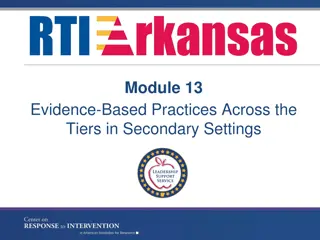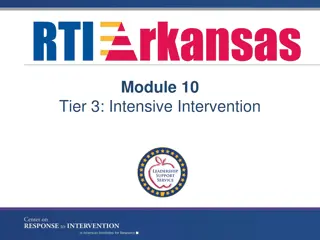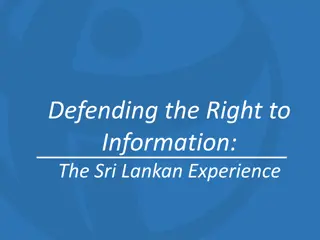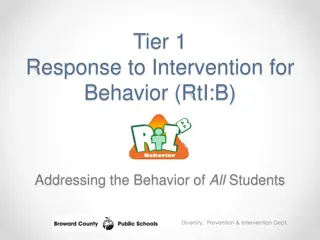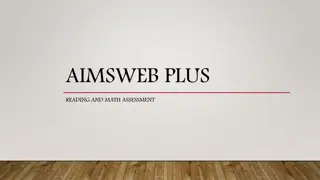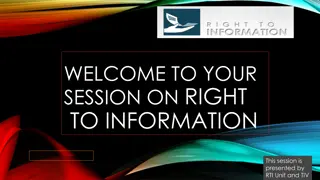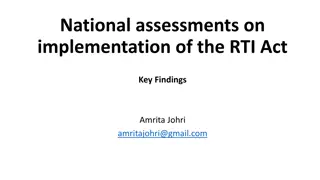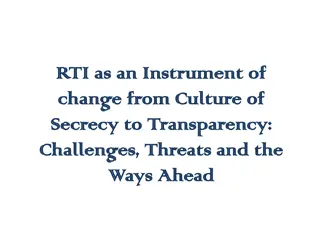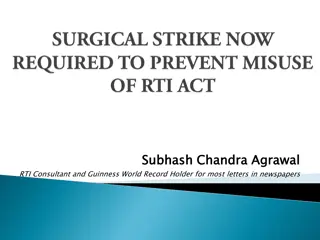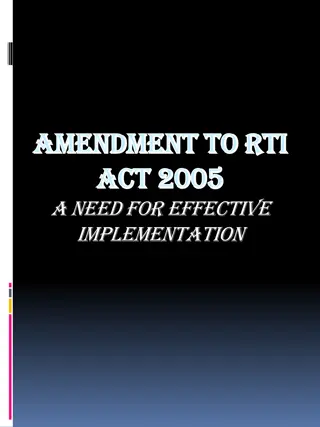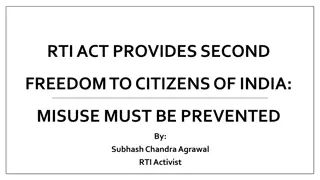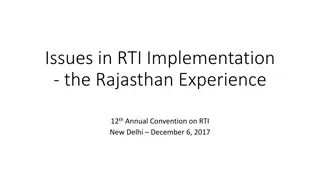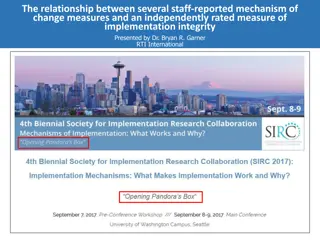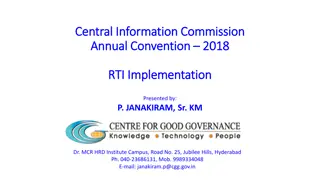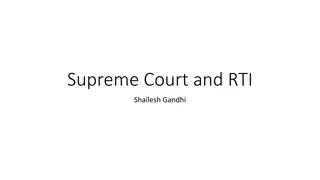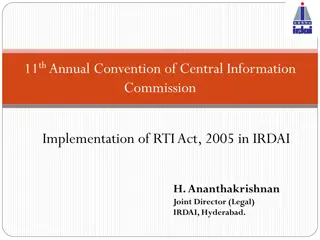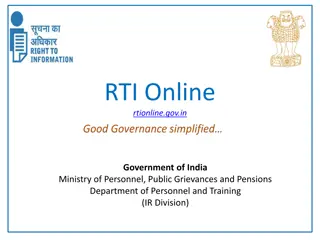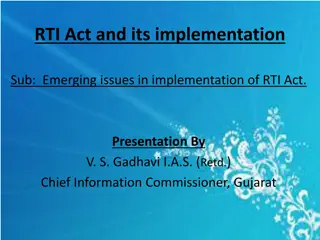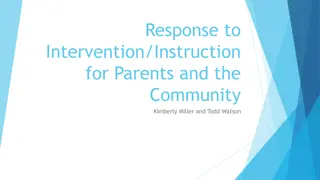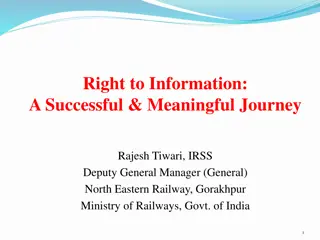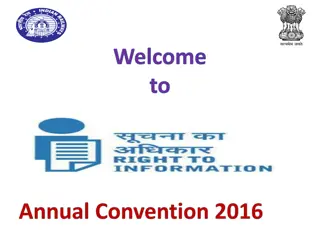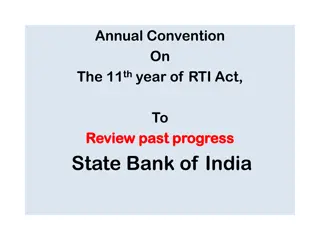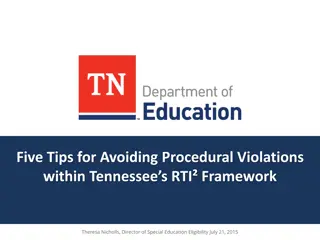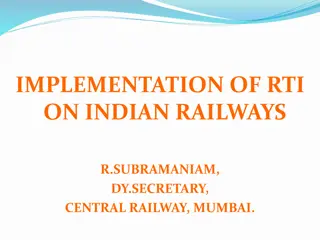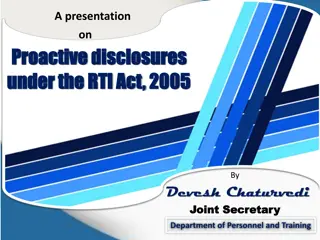Implementing Evidence-Based Practices in Secondary Settings
Explore the relationship between RTI, evidence-based practices, and high leverage practices in secondary education. Understand the importance of implementing EBPs and HLPs across prevention tiers. Discover the key objectives and considerations for applying these practices effectively.
0 views • 62 slides
Understanding Tier 3 Intensive Intervention in RTI Systems
This content delves into the critical features of Tier 3 interventions within Response to Intervention (RTI) frameworks. It covers the objectives of Tier 3 systems, designing and implementing interventions, problem-solving processes, essential components of RTI, evidence standards for interventions,
0 views • 64 slides
Defending the Right to Information: The Sri Lankan Experience
The Sri Lankan experience in defending the right to information involves sensitizing citizens and journalists prior to enactment, influencing key decisions during enactment, publicizing the use of RTI post-enactment, and learning valuable lessons such as resetting power imbalances and the importance
0 views • 7 slides
Enhancing Emergency Obstetric and Newborn Care through First Referral Units
Historical background and strategic approach to improve emergency obstetric and newborn care through the establishment of fully functional First Referral Units (FRUs) in districts, focusing on critical services, infrastructure needs, and essential facilities. The initiative aims to provide 24-hour d
1 views • 24 slides
Effective Discipline Procedures and Strategies in RtI:B Implementation
This content focuses on RtI:B Tier 1 strategies to address the behavior of all students, emphasizing effective discipline procedures, team collaboration, data analysis, and faculty commitment. It delves into critical elements including developing responses to problem behavior and using various sourc
1 views • 44 slides
A comprehensive overview of AIMSweb Plus: Reading and Math Assessment
AIMSweb Plus is an online assessment, data management, and reporting system designed for students from Kindergarten to 8th grade. It offers national and local performance norms for screening and progress monitoring in math and reading skills. The system helps uncover learning gaps, identify at-risk
0 views • 6 slides
Understanding Right to Information and its Implementation in Vanuatu
The session on Right to Information (RTI) aims to enlighten participants on access to information, its importance in community participation, and the process of obtaining information. Vanuatu's commitment to RTI is evident through the National RTI Policy and Act, aligning with global conventions for
0 views • 32 slides
National Assessments on Implementation of the RTI Act: Key Findings
The report highlights key issues in the implementation of the Right to Information (RTI) Act in India, including growing delays in Information Commissions, poor proactive disclosures, and lack of accountability. It reveals the estimated time for a new appeal/complaint to be heard by the Information
0 views • 6 slides
Impact of Right to Information Act on Transparency and Accountability: Challenges and the Way Forward
The Right to Information Act is a crucial tool in transforming the culture of secrecy to transparency. It aims to promote accountability, eradicate corruption, and empower citizens. However, the implementation of RTI faces challenges such as lack of proactive thinking in bureaucracy and infrastructu
11 views • 15 slides
Insights into the Indian RTI Act and Proposed Amendments
Subhash Chandra Agrawal, a renowned writer and Guinness World Record holder, sheds light on the Indian Right to Information (RTI) Act of 2005. He discusses the Act's significance in promoting transparency and democracy, highlighting proposed amendments that could impact the autonomy of Information C
0 views • 18 slides
Challenges and Solutions in Preventing Misuse of the RTI Act in India
Over the years, the RTI Act in India has faced challenges due to misuses by individuals for personal gains. Efforts to prevent such misuse through training, Supreme Court verdicts, and CVC circulars have been observed. The need for regular modifications and refinements to address misuse and maintain
0 views • 11 slides
Strengthening the Implementation of RTI Act 2005: Areas for Improvement
The amendment to the RTI Act 2005 seeks to enhance its effectiveness by focusing on areas like maintenance of public records, proper utilization of resources, and ensuring accountability. Suggestions include introducing procedures for record preservation, scanning documents, and using both soft and
0 views • 13 slides
RTI Act: Empowering Indian Citizens and Ensuring Accountability
The Right to Information (RTI) Act in India has provided citizens with a powerful tool to expose corruption and promote transparency in governance. This Act has led to significant reforms and discussions on issues such as judicial accountability and political party transparency. Efforts are needed t
0 views • 9 slides
Challenges in RTI Implementation: Rajasthan's Perspective
Rajasthan faces various challenges in the implementation of the Right to Information Act, 2005. Issues include gaps in suo-moto disclosure, faulty records management, and resource crunch manifestations. These challenges hinder the effective functioning of the RTI machinery in the state, impacting tr
2 views • 16 slides
Navigating School Board Disciplinary Hearings: Strategies for Success
Prevail in school board disciplinary hearings with expert advice from Beverly Brown, Ph.D., Esq. Explore the challenges of disparate discipline practices, understand compulsory attendance laws, and discover effective school responses to student behavior. Learn about due process, privileges, poverty
0 views • 91 slides
Understanding the Relationship Between Staff-Reported Mechanisms of Change and Implementation Integrity
Dr. Bryan R. Garner from RTI International presented the relationship between staff-reported mechanisms of change and implementation integrity. The Substance Abuse Treatment to HIV Care (SAT2HIV) Project successfully addresses National HIV/AIDS Strategy Goals and related needs through various measur
0 views • 23 slides
Successful Implementation of Right to Information: Key Factors and Observations
Effective implementation of the Right to Information (RTI) depends on various stakeholders' competencies at different levels, including government authorities, civil society organizations, and applicants. When RTI is successfully implemented, information is freely available, public authorities are t
0 views • 18 slides
Overview of RTI Act and Key Legal Cases
The content discusses the Constitutional position of the Right to Information (RTI) Act in India, highlighting Article 19 and Section 7(1) of the RTI Act. It also delves into significant legal cases such as CBSE vs. Aditya Bandopadhyay and Girish Ramchandra Deshpande vs. CIC, emphasizing the balance
0 views • 9 slides
Broad Outlines and Functions of the IRDAI in the 11th Annual Convention of Central Information Commission
The 11th Annual Convention of Central Information Commission focused on the implementation of the RTI Act, 2005 within IRDAI and highlighted the powers and functions of the Authority in areas such as registration, policy holder interests, intermediary regulations, and insurance business efficiency.
0 views • 22 slides
Understanding the Right to Information (RTI) Act in India
The Right to Information (RTI) Act in India empowers citizens to seek information from public authorities, promoting transparency and accountability in governance. This process involves writing a request letter, paying RTI fees, and following specific procedures for filing and appealing RTI requests
0 views • 28 slides
Challenges and Recommendations for Effective Implementation of RTI Act in India
Emerging issues in the implementation of the RTI Act include the inadequate staffing of information commissions, non-compliance with orders, and lack of attention from higher authorities. The challenges also extend to training, proactive disclosure, and legal issues. Recommendations are put forth to
0 views • 8 slides
Understanding Response to Intervention (RtI) for Effective School Support
Response to Intervention (RtI) is an evidence-based model in education that integrates academic and behavioral instruction and intervention to support students at different levels. It aims to prevent issues, intervene early, and promote student success. RtI involves all students in the school, with
0 views • 10 slides
Enhancing Transparency and Accountability in North Eastern Railway through Right to Information
The journey of Rajesh Tiwari, Deputy General Manager of North Eastern Railway, highlights the significance of Right to Information (RTI) in ensuring quality railway services. With over 55,000 employees and numerous stakeholders, RTI plays a crucial role in promoting transparency and fair practices i
0 views • 12 slides
Importance of Right to Information (RTI) Act in Governance
The Right to Information (RTI) Act of 2005 in India has been a crucial tool in enhancing transparency, accountability, and citizen participation in governance. It empowers the public to engage with their representatives and government, combat corruption, ensure good governance, and promote public ac
0 views • 26 slides
Right to Information (RTI) Implementation at REIL Jaipur
The presentation covers the implementation of the Right to Information (RTI) Act at Rajasthan Electronics & Instruments Limited (REIL) in Jaipur. It highlights the significance of transparency, accountability, and good governance in the organization, providing information on the practical regime of
0 views • 14 slides
Study on Transparency Law (RTI) at Grass-roots Level in Bihar and Rajasthan
This report delves into the role of Transparency Law (RTI) in enhancing democracy through public participation at the grassroots level in Bihar and Rajasthan, focusing on the comparative analysis of its implementation in villages and blocks. It aims to explore how RTI connects people to the governme
0 views • 17 slides
State Bank of India - Annual Convention and Functions Overview
State Bank of India, the largest commercial bank in India, recently held its annual convention to review progress under the RTI Act. The bank, being a central figure in the country's financial sector, engages in various functions including central banking and general banking operations. With an exte
0 views • 14 slides
Innovative Learning Centers for Middle School Students
Revolutionize your middle school classroom with Centergize, a program designed to bring Common Core concepts to life through cooperative learning groups focusing on RTI, close reading, technology, and meaningful discussions. Discover how learning centers engage students independently or in small gro
0 views • 62 slides
Legal Architecture of Land Governance in India: Access to Information Challenges
This document explores the legal framework of land governance in India, focusing on access to information challenges. It discusses the objectives and projects of the CPR Land Rights Initiative, emphasizing the legal obligations under the RTI Act, 2005. The initiative highlights the importance of mai
0 views • 26 slides
Addressing Excellence Gaps in Education
Explore a three-step process to measure and address excellence gaps at the district level in education, focusing on defining the excellence gap, inspiring action, and bridging the gap using a Response to Intervention (RtI) model. Learn about the disparity in academic performance between marginalized
0 views • 18 slides
Avoiding Procedural Violations in Tennessee's RTI Framework
Gain valuable insights on avoiding procedural violations within Tennessee's Response to Intervention (RTI) framework through the guidance provided by Theresa Nicholls, Director of Special Education Eligibility. Learn about the risks associated with procedural violations, review pertinent case law, r
0 views • 29 slides
Implementation of RTI on Indian Railways Research Findings
Research led by R. Subramaniam, Dy. Secretary at Central Railway, Mumbai, studied the implementation of RTI on Indian Railways. The study involved senior Railway Officers from various departments, using a questionnaire as a data collection method. Findings include insights on the impact of RTI on wo
0 views • 30 slides
Teacher Well-Being as a Critical Element in Remote Learning Success During the Pandemic
Maria Perlita E. de Leon from RTI International discusses the importance of teacher well-being in the success of remote learning amid the pandemic. The study emphasizes the need to protect and foster teacher well-being to maintain education quality, especially in challenging teaching contexts. Teach
0 views • 18 slides
Understanding RTI Law and Freedom of Information in Vanuatu
This content provides insights into the importance of RTI law for civil servants, emphasizing transparency and accountability. It covers the objectives of the course, the concept of freedom of information, the necessity of such laws in Vanuatu, and the benefits of openness in governance. The focus i
0 views • 68 slides
Understanding Disclosures under the RTI Act
Exploring the evolution of disclosures under the RTI Act of 2005, this presentation outlines the shift from the Pre-RTI regime of holding onto information to the Post-RTI regime of proactive disclosures. It delves into legal provisions mandating Public Authorities to maintain transparency through Se
0 views • 14 slides
Rock 101 Academic Program for Student-Athletes Policies and Procedures
This detailed content outlines the policies and procedures of the Rock 101 Academic Program for student-athletes, including attendance requirements, eligibility criteria, meeting deadlines, and the use of RTI time. It covers essential information such as exit criteria, eligibility status, and conseq
0 views • 10 slides
Transparency and Efficiency in Handling RTI Requests: Case Studies and Growth Analysis
Explore the effective handling of RTI requests, analysis of growth trends, and case studies demonstrating transparency and responsiveness to communication. Uncover insights on the percentage of appeals, mistakes corrected through RTI requests, railway recruitment case studies, and refund case resolu
0 views • 12 slides
